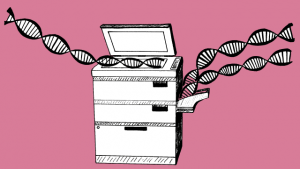Trying to predict your future is a near impossible challenge. Astrologers or soothsayers may seek answers by consulting the stars or scripture. However, there is infinitely more information about your future in your spittle than there is in the heavens or any man-made book. This is because your saliva contains millions of copies of your personal version of the greatest book ever written. This book is your genome, four billion years in the making and written using a four-letter code.
Deciphering this code is the job of geneticists. Simply to read the three billion letter human genome for the first time took an international team of 2,500 scientists with a budget of £2 billion over a decade. It sits proudly in 24 volumes (representing each chromosome) taking up an entire bookshelf at the Wellcome Trust in London. But as Harvard geneticist George Church puts it: “printing out a copy of an ancient text isn’t the same as understanding the language”. However, thanks to the human genome project, geneticists are rapidly beginning to unlock the mysteries contained within this code. The results promise to tell you about who you are, where you come from, and what lies in your future.
Since the human genome was published in 2001, researchers have identified thousands of mutations that are either influence human traits, future susceptibility to disease, or are informative of ancestry. I sent my saliva in a plastic tube via airmail to America to the company 23andme to be screened for these variants. The end product is more like the blurb on the back cover than the entire book, a plot summary that doesn’t give away all the secrets within.
My story begins by tracing my Neanderthal roots. Scientists have sequenced DNA from Neanderthal bones buried in a cave in Croatia for 38,000 years, a feat reminiscent of something out of Jurassic Park. They determined that when Homo sapiens first left Africa around 60,000 years ago, we interbred with Neanderthals, and everyone today who has non-African ancestry is between 1-4% Neanderthal. Neanderthals were not the brutish and primitive cavemen that have been portrayed in popular culture. They did live in caves, but were human and live on through us. Or at least this is what I like to think given that I am 2.6% Neanderthal.
My DNA also highlights my more recent ancestry. The majority of Europeans that share my Y chromosome type are Ashkenazi Jews, which fits since my paternal grandfather was a German Jew fortunate to be taken in by Britain before the war. The rest of my genome is disappointingly dull, quintessentially North European, without a trace of African or Asian ancestry.
The results also revealed; I’m likely to be a better long distance runner than a sprinter, not resistant to HIV but completely resistant to the vomiting bug norovirus, a fast metabolizer of caffeine, with typical odds of male pattern baldness.
Furthermore with susceptibility to over 30 common diseases tested, there was inevitably going to be some bad news. And so it proved, I am at an increased risk of prostate cancer, bipolar disorder, and an irregular heart rhythm. Most of these variants increase risk by less than two-fold. However, you are ten times more likely to get Alzheimer’s if you carry the variant ApoE4 on both copies of chromosome 19. I felt very relieved when the results came back negative.
These mutations do not determine your destiny, and you may carry none of the known variants for a disorder yet still get it. This raises questions about the appropriateness of these types of genetic tests, because despite our progress they are generally not as predictive as family history, and often there is little you or your doctor can do about the results.
The cost of whole genome sequencing is plummeting; it will drop below £1,000 by next year. Our understanding has grown exponentially in turn and geneticists will inevitably reveal that we all carry hundreds of mutations that limit our abilities or are potentially detrimental to our future health or the health of our children. It won’t be long before companies like 23andme offer whole genome sequencing. With treatments lagging behind this information may cause undue stress.
However, it is these imperfections that help to make us unique and define who we are. Our genomes trace not only our family tree, but place us in the tree of life. The story your genome tells is captivating, as Richard Dawkins puts it in Unweaving The Rainbow: “You could spend a lifetime reading in this ancient library and die unsated by the wonder of it.”
![The Greatest Book Ever Written – Pre-Order Now For £1,000 Trying to predict your future is a near impossible challenge. Astrologers or soothsayers may seek answers by consulting the stars or scripture. However, there is […]](/wp-content/uploads/2011/10/Copy-and-paste_preview-620x300.png)
